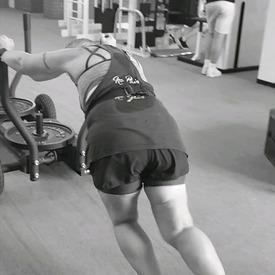Do you eat your fitness calories?
Replies
-
Whether you do or don't eat back calories is personal preference, find what works for you and is sustainable and repeat it with consistency. It's not that difficult
7 -
I eat all of the calories and then some, b/c I needed to gain weight/mass.
I am also into lifting...but also into reality. I only burn 100-200 calories per hour of powerlifting. Just completed third powerlifting meet and now hold squat/bench/dl/total state records in 2 weight classes...still only burn max 200ish calories. Reality is lame.6 -
I eat back some, but not all.-- probably about 75%. That's because I don't think I am REALLY earning as much as the log tells me. Be careful of programs (including this one!) that over-estimate calorie burn. Also, some days when I don't exercise, I tend to go over a bit-- this gives me a bit of a cushion.
Also another bug about how activity calories are calculated in the log:
I have my activities imported automatically from Garmin Connect, but interestingly it imports total calories instead of net calories for the activities. The difference is about 50 calories per hour of activity. So if I were to eat back all the calories that MFP gives me for my activity, I'd be eating a bit too much.1 -
Every single one.2
-
Currently eating all my exercise calories back in popcorn.21
-
OP, I don't eat exercise calories, however, I have manually overridden the 1200 minimum default I was given to a more reasonable 1700. So that more than makes up for exercise.
Best thing to do is to work from your own numbers. Exercise calories are frequently overstated. Sometimes substantially.5 -
1/2-2/3 of them (fewer if it's Fitbit estimates since that seems to really overestimate for me).0
-
Anyway, I don't eat back my exercise calories because my bariatric specialist told me I shouldn't. I am severely morbidly obese, and working on losing weight.
I'm no expert, but I would think the "right" answer for each person might vary depending on their exact situation, though (whether you're trying to lose or maintain weight, how much weight you need to lose, how hard you're training, or whatever).2 -
I eat half. I have lost 100 pounds in 15 months doing that. I feel like the exercise calories may not be accurate so eating half imo is the best way to go.1
-
No. I very rarely do anything that burns many calories and if I do I just figure it all evens out.3
-
NorthCascades wrote: »This is another "I'm not getting the results I want because I'm using an HRM for calories" thread.

I'm just asking opinions, it's not about NOT getting results it's about maximizing those results.0 -
Dear Posters,
Threads in the General Diet and Weightloss Help board need to remain focused on the questions of the OP of the thread. If you wish to discuss your own questions or another topic that arises please start your own thread. Leading a thread off track is hi-jacking, a warnable offense as per MFP guideline 2. If you need a refresher on the MFP guidelines they can be found here:
http://www.myfitnesspal.com/welcome/guidelines
@andysport1 @ninerbuff @VintageFeline if you wish to continue answering Andy's questions please see the discussion created here:
http://community.myfitnesspal.com/en/discussion/10585717/do-you-eat-your-fitness-calories-part-2#latest
Thanks for your cooperation,
4legs
MFP moderator0 -
KurumiSophia wrote: »I try not to.
If you are only eating 1100 a day you really should eat them. Malnutrition isn't fun3 -
This is why you eat them.
http://community.myfitnesspal.com/en/discussion/comment/33817997/#Comment_33817997Faithful_Chosen wrote: »Losinandmovin wrote: »Faithful_Chosen wrote: »Two weeks is not a lot, so be patient and keep at it... But just to be sure: do you weigh everything in grams? Do you eat back all you exercise calories? Weight loss is a simple equation: calories in vs calories out: eat at a deficit and you lose. People tend to underestimate what they eat (especially when weighing in cups and pieces) and overestimate their exercise burns (do not trust MFP or your device. Heart rate monitors for steady-state are the only things even close to accurate). Weigh and log all your food in grams on a digital scale up to your goal as set by MFP and eat back 50 to 75 percent of you exercise calories (75% for HRM) and you will lose. It's science.
What is HRM? WHY would one eat back their exercise calories? Wouldn't that deficit lead to weight loss? What are you reading and basing your advise on? I really want to lose this weight, but some of the advise I'm reading on MFP confuses me. I'm a registered nurse, and fairly intelligent, but some of the acronyms I see on here are foreign. Thank you.
Thanks, everyone, for the answers already I am just going to add that MyFitnessPal calculates your projected loss (so, the amount you have set to lose a week) into the net goal you recieve. It assumes that if you want to eat more, you have to move more to stay in that deficit. Makes sense, right?
I am just going to add that MyFitnessPal calculates your projected loss (so, the amount you have set to lose a week) into the net goal you recieve. It assumes that if you want to eat more, you have to move more to stay in that deficit. Makes sense, right?
Now, especially newbies have a tendency to up the cardio and decrease the food to make a bigger deficit, assuming they will lose faster--and they might! I am not gonna sit here and say that you won't lose more. It's probably not going to show up on the scale due to water weight, but they will lose more. The question is: at what price? And what are they losing?
The MyFitnessPal method (built in deficit based on your numbers, especially plus purposeful exercise) is designed to steadily lose fat and preserving as much muscle as possible. You see, there is a (science proven) limit to how much fat a body can convert into usable energy during any period of time. If you go over that limit, it turns to muscle for fuel instead. You will always get a little bit of muscle tissue loss when eating at a deficit, but if you undereat and up the cardio (or even strength training!) like I see a lot of people on here do, you are forcing your body to canibalize its muscle tissue on top of the max level of fat it can burn. Not to mention that meeting your macro and micro nutrient goals with this method is virtually impossible, creating massive hormone imbalances (leptine, for example) and vitamins and mineral deficits.
The long term effects of crash dieting and deprivation dieting (which is basically what happens when you become one of the people who net in the low hundreds to negatives day after day for an extended period of time) can be really severe. Basically, you are systematically starving yourself, after all. The results tend to be this (one example, hypothetical you):
- your body burns fat, then muscle tissue to sustain itself. You become weaker and sore. You also start having cravings because your brain is sending out warning signs: 'I am starving! Feed me!'. So, you either binge and up your overall net a little, or you persevere and pat yourself on the back for a job well done! You wanted lots of fatty food, but you fed it a celery stick instead. Sadly, your whole timeline congratulates you on your willpower. You start to wonder, though, why your willpower is not being rewarded! The scale doesn't budge! You fail to realize it's because of water weight due to too much exercise and the body's inability to recover due to a lack of nurishment. The solution is often to eat even less and work out even more to get the scale to move.
- the body is further unable to sustain. It changed the body's chemistry to preserve all it can--after all, it needs to protect vital organs from becoming affected and keep you going so you can hunt and gather for food! At this stage, the body becomes its own worst enemy: it no longer tells you you are starving so you can make a last ditch effort to get food. You think you are fine on 1000 calories a day, burning 1200, because your body shows no signs of hunger anymore, but basically, the little neutrients you are providing your body with get sucked towards your vital organs, leaving nothing for the rest. You become more tired, and cranky, and your muscles no longer recover from all the stress you put them through working out. As a result, they break down even faster and hold on to even more water to prevent that breakdown from affecting your ability to throw a spear at a prey animal (hey, I can't help it your body still thinks we are living in caves!). The scale drops oh so slowly--if at all--but meanwhile you do see you are slimming down! Your measurements are less! MyFitnessPal celebrates! 'Hurray! The weight must come off in a 'woosh' soon now! Keep doing what you are doing!'. Note that (thankfully) many people drop out at this stage. The psychological burden becomes too great, they feel *kitten*, and life isn't fun anymore. They stop dieting, start binging, and gain even more weight. The jojo'ing has begun.
- you keep doing what you were doing. We are a few months in now. You develop headaches, fatigue, and you start finding more and more hair on your pillow in the morning. In fact, you start finding hair everywhere. You also get hungry again, not in a way that makes you binge but a sort of steady nagging: a gentle reminder that time is running out. Fail to meet it (MyFitnessPal people pat your back when you tell them you went to bed early instead of having more food) and slowly, your body gives up its protective hold on more systems. You can survive without full function to certain organs, so your body throws them to the wolves: nutrients go towards your brain, heart, and lungs. Pretty much all other organs start running at half capacity. You hold on to more toxins, which start chipping away at your system, and your ability to process food (get nutrients out of them) suffers greatly, so you are truly starving now. This is the point where the weight starts coming off, and pretty quickly, too, usually. A big whoosh! (MyFitnessPal people cheer in the distance). What you are really seeing is your body giving up on protecting muscle tissue completely: the water weight falls away, showing you that you actually did lose a lot of fat and muscle tissue. More cheering! It must be working! Keep at it! Work harder! Eat less!
- now you are in serious *kitten*! Your organs are not keeping up, your muscles are breaking down, and the body has to start looking elsewhere for fuel: your organs and the more vital muscles, including your heart. At this point, your nails will become brittle and start falling out. Your hair falls out. Your period stops. You experience bouts of nausea and muscle weakness. You might find yourself pulling into a run and suddenly blacking out. You still function, but on the inside you are shutting down.
From here on out, it all depends on if you start eating again and stop exercising or not. If you don't, you can end up killing yourself. If you do, it is a long road to recovery, sometimes lasting years and it sometimes includes permanent damage to the function of certain organs, especially the liver and kidneys. Worst of all, this entire crash diet hasn't taught you how to sustain weight loss, so as soon as you crash and burn, the weight flies back on! And trust me, it takes a fraction of the time it took to lose it to gain it back.
I am not saying this to frighten you (well, I am a little), but as a nurse, you should be aware of the ramifications of crash dieting. Those of us that do realize the effects therefor recommend you lose weight slowly, at a sustainable rate that gives you the best ratio of fat loss vs. muscle loss. Stick to your MyFitnessPal calculated net, take the time, eat back your true exercise calories (which is probably 50 to 75 percent of your machine or database given calories), and learn how to eat (and what to eat) for weight loss you can maintain for years to come. It might not go as fast, but you will be able to see it on the scale, and best of all, it will be safe. That is my very long winded answer to 'why' you should eat back exercise calories.
4 -
If I burn 500, I will eat up to 250 of them but I try not to eat all of them if I'm working on shedding a few more pounds. Otherwise, I eat them all up.0
-
gebeziseva wrote: »Yes I do and you are supposed to.perkymommy wrote: »Not true.
If you are using MFP the way it is designed to be used, you are indeed supposed to eat the calories you earn from exercise.
MFP uses the NEAT method (Non-Exercise Activity Thermogenesis), and as such this system is designed for exercise calories to be eaten back. However, many consider the burns given by MFP to be inflated and only eat a percentage, such as 50%, back. Others, however, are able to lose weight while eating 100% of their exercise calories.
My FitBit One is far less generous with calories than the MFP database and I comfortably eat 100% of the calories I earn from it back.
http://community.myfitnesspal.com/en/discussion/818082/exercise-calories-again-wtf/p11 -
Like others have stated, I eat a portion of the exercise calories (sometimes half, sometimes more). I'm always concerned that they were overestimated, so I try not to eat them ALL back. However, it's not a big deal of I do eat them all, because it only brings me back to the calorie amount allotted in order to lose weight over time.1
-
BootyEvolve wrote: »Do you eat your fitness/workout calories? I'm set at 1200 calories but on a good workout I can burn 500. I'm not sure if eating those calories can inhibit my weightloss.
I eat as many as I can, if I can't eat them all that day then I'll eat them over the next few days. There's only so much I can eat and I have a couple of crazy active days per week.
1 -
I usually eat back about half my exercise cals.0
-
I do unless I'm banking for pizza and beer on Friday
 2
2 -
I think it's really unkind to say people are masochistic, starving themselves, etc. for making a different choice than you do. If you're going through your day with the energy you need, not crashing, not starving, and you're losing at a steady pace, that's great. The tools here are very helpful but we all know the exercise estimates are totally hit or miss in calorie counts. I plan my meals without exercise and the extras are a bonus. If I would be hungry, feel not up to my exercise, I'd eat more. I also do higher calories on a general day, at least 1400, so I'm not at an aggressive target. I obviously don't judge those who are.
I do keto so I don't log my food every day, just when I need to check in. Because I seem to be able to hit portion control when my hunger swings are stopped by low carb eating. But the tools are very useful for me as well as the community. Especially when we remember we're all adults here and that if someone actually does have an eating disorder, it's something to treat, not something to mock.4 -
I usually do. I wear a heart rate monitor for cardio and also use a Fitbit. I love to eat, and working out is a great incentive for me because I get to eat more.0
This discussion has been closed.
Categories
- All Categories
- 1.4M Health, Wellness and Goals
- 398.2K Introduce Yourself
- 44.7K Getting Started
- 261K Health and Weight Loss
- 176.4K Food and Nutrition
- 47.7K Recipes
- 233K Fitness and Exercise
- 462 Sleep, Mindfulness and Overall Wellness
- 6.5K Goal: Maintaining Weight
- 8.7K Goal: Gaining Weight and Body Building
- 153.5K Motivation and Support
- 8.4K Challenges
- 1.4K Debate Club
- 96.5K Chit-Chat
- 2.6K Fun and Games
- 4.8K MyFitnessPal Information
- 12 News and Announcements
- 21 MyFitnessPal Academy
- 1.6K Feature Suggestions and Ideas
- 3.2K MyFitnessPal Tech Support Questions




















